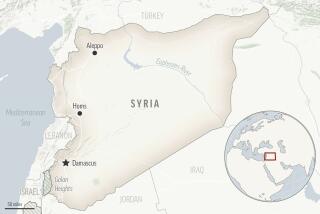Iraqi police arrest high-ranking member of U.S.-allied movement
- Share via
SAMARRA, IRAQ, AND BAGHDAD — Iraqi police have arrested a senior member of the U.S.-allied Awakening movement in Salahuddin province, the American military said Sunday, continuing a crackdown that has left many of the Sunni Muslim paramilitary fighters seething with anger.
Mullah Nadim Jibouri, an Awakening leader in the town of Duluiya, 55 miles north of Baghdad, was detained Saturday along with two of his brothers, the military said.
Awakening leaders have been squeezed from all sides in recent months, with Iraqi authorities carrying out a series of arrests against them and Al Qaeda in Iraq continuing to target them with bombs. Late last month, Jibouri escaped a suicide attack at a mosque in the town where he was also an imam. The bomber, who detonated an explosives vest, killed five people and wounded 18, including one of Jibouri’s now-detained brothers.
In an interview with The Times the day after the explosion, Jibouri blamed the attack on the insurgents he had abandoned when he agreed to join the Awakening, called the Sons of Iraq by the U.S. military.
“There are people who I used to be fighting with who are seeking to settle scores with me,” he said. “I left them and now I am fighting them, so it’s obvious that they will target me.”
Interviewed Sunday at the police station where he is being held, Jibouri said he did not know why he had been detained, but said he did not believe it had anything to do with his activities as an Awakening leader. “It’s a personal matter,” he said.
Iraqi authorities have said Jibouri is a former senior Al Qaeda in Iraq leader who is being held in connection with “terrorism” committed before he joined the Awakening. But movement leaders complain that, under the terms of the deal they reached when they agreed to team up with the Americans against the insurgency, they are supposed to be immune from prosecution for earlier actions.
“We made an agreement with the Americans, before the formation of the Awakening, to give immunity to all the fighters who have participated in the resistance,” said Sheik Khalid Filayah, the Awakening leader in Samarra. “Therefore they don’t have the right to arrest anybody who may have been involved in operations against the Americans before the cease-fire.”
The Iraqi government, however, has given no such promise of immunity.
The U.S. military has not always been informed by the Iraqis about the arrests of its allies. In this instance, U.S. military advisors were present when Iraqi police officers served the arrest warrant, but they do not know why Jibouri was arrested, said Maj. Derrick Cheng, a spokesman for U.S. forces in northern Iraq.
“Coalition forces had a very minor role in this as the warrants originated from the Iraqis,” he said.
--
Rasheed is a special correspondent. Times staff writer Caesar Ahmed contributed to this report.
More to Read
Sign up for Essential California
The most important California stories and recommendations in your inbox every morning.
You may occasionally receive promotional content from the Los Angeles Times.












